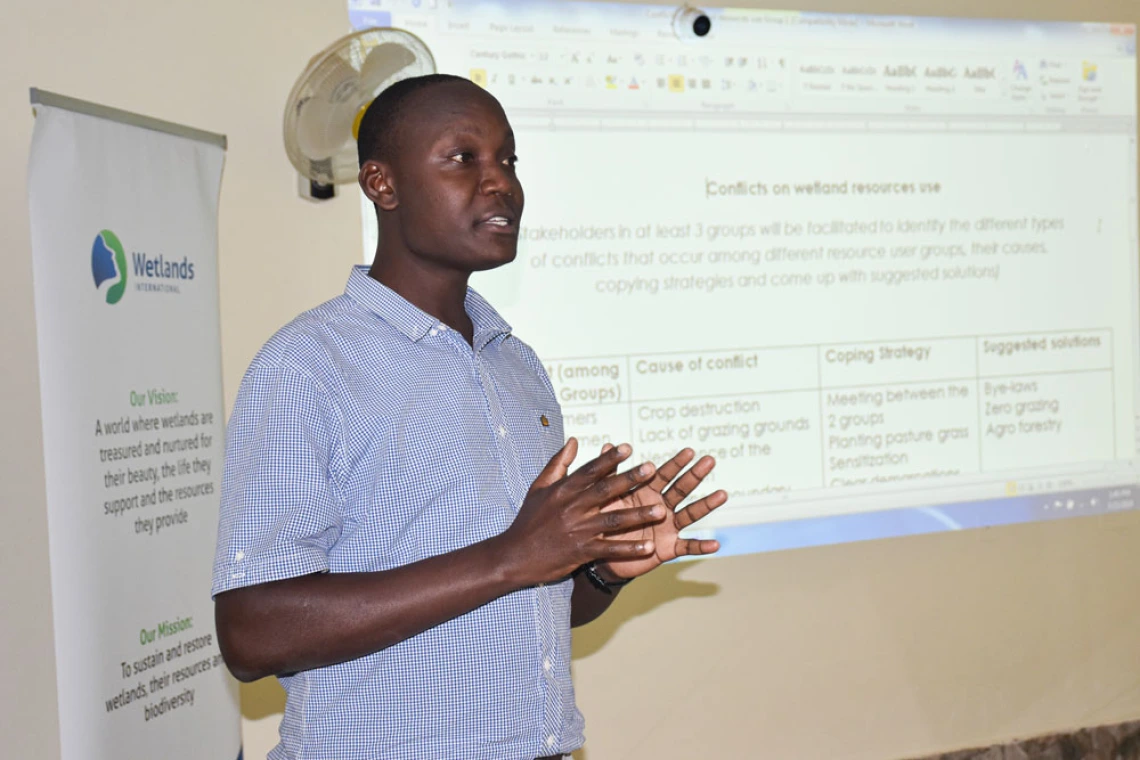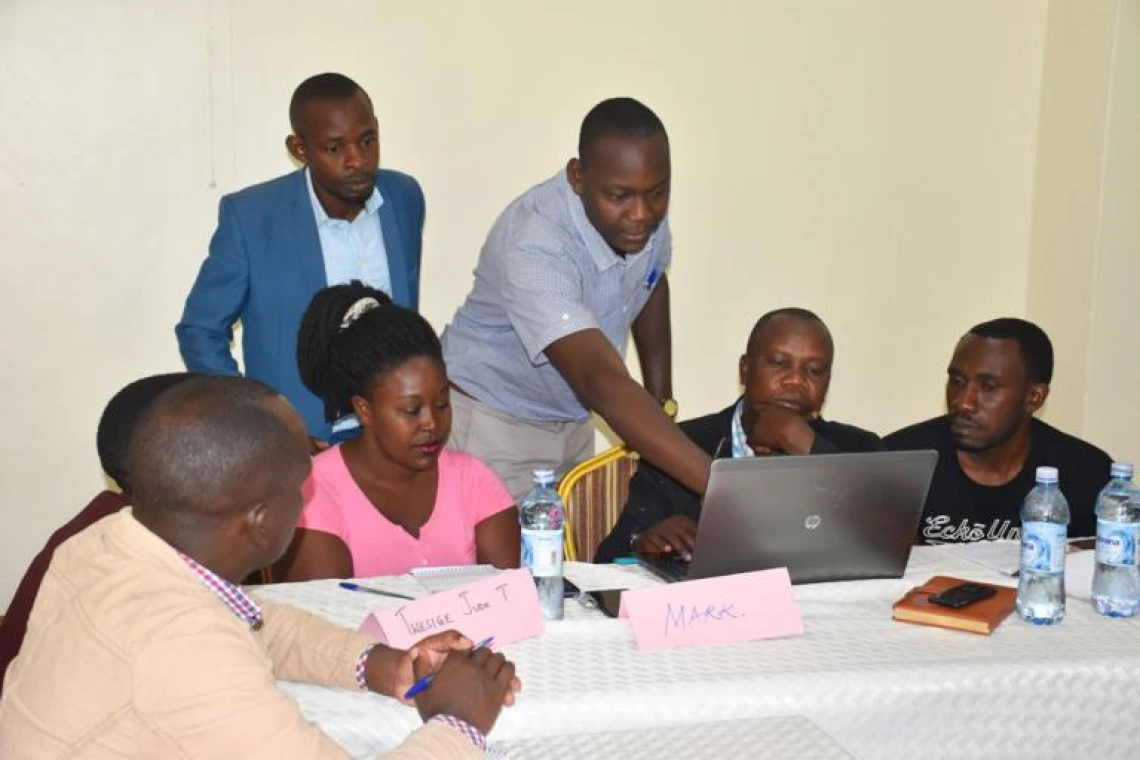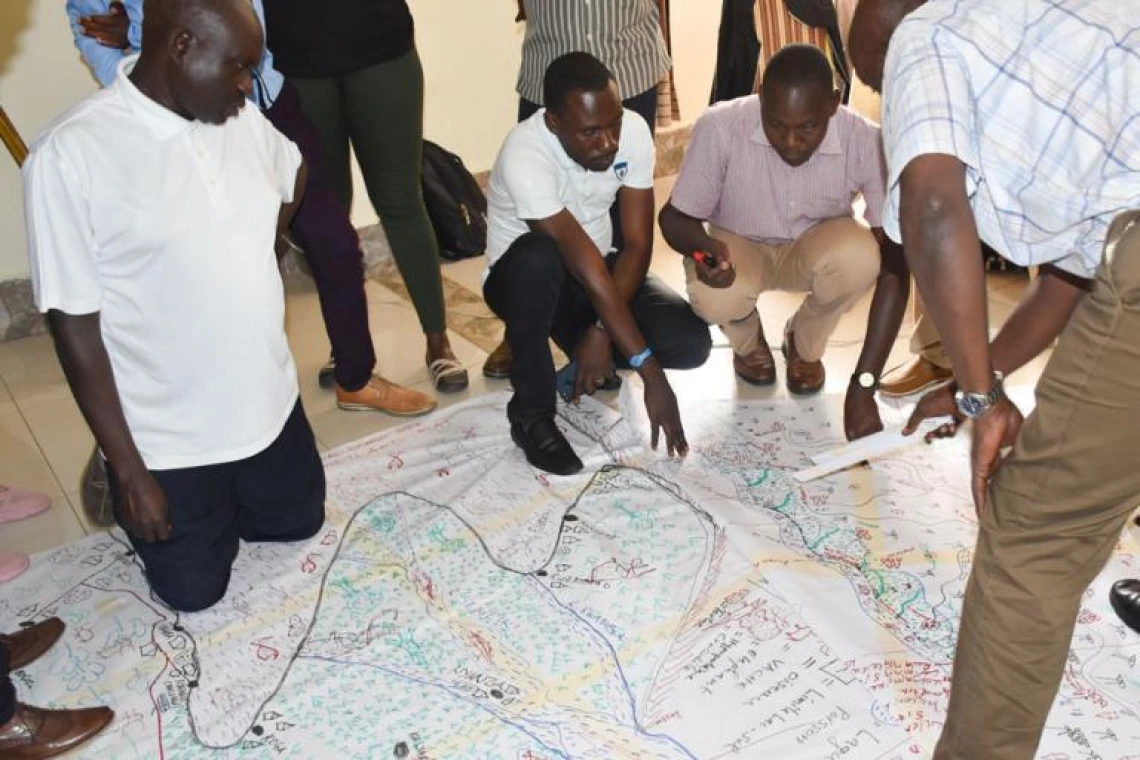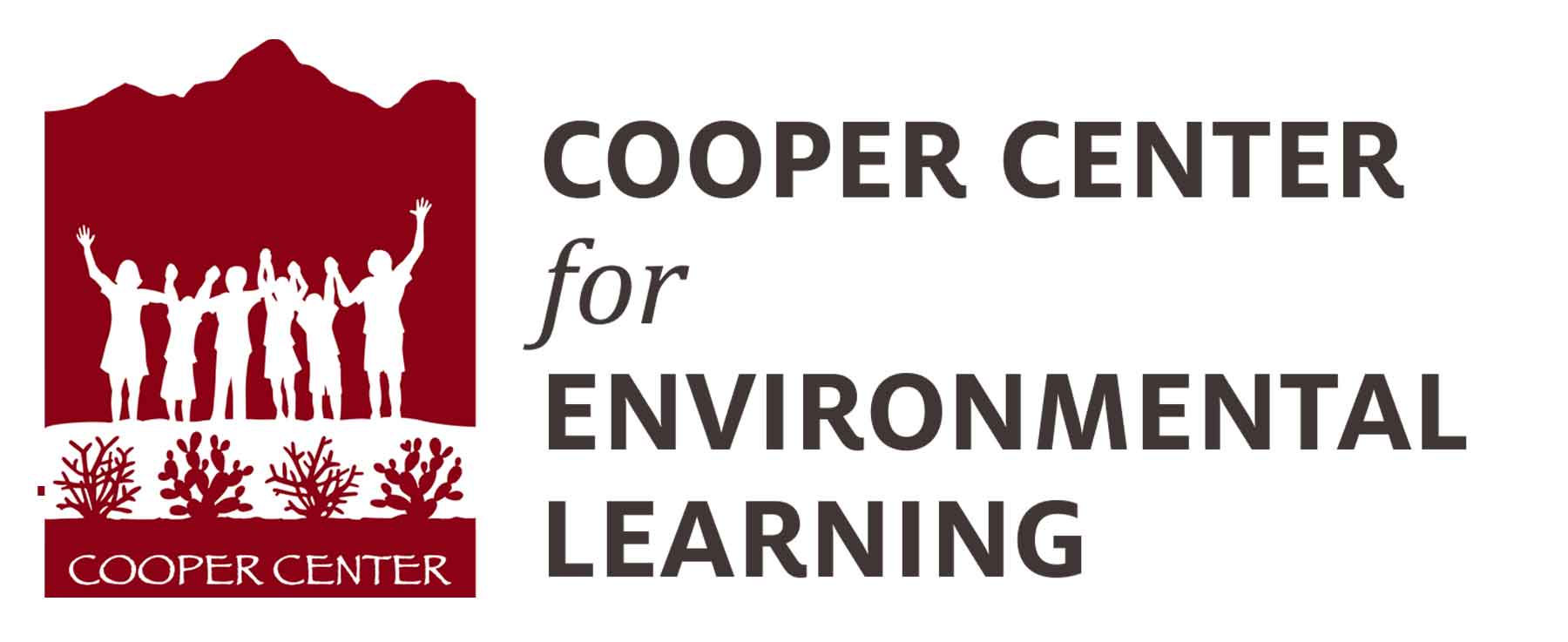Staff Alum Spotlight: Zephaniah Migeni

Kenyan environmental consultant, Zephaniah "Zeph" Migeni conducted an externship at the Cooper Center in 2010-2011 and has since returned to Kenya to marry and continue his work for the African Center for Aquatic Research and Education, based in Michigan, where he coordinates information exchange for over 80 freshwater experts from 10 countries and ensure that they meet regularly to discuss and develop scientific sound way forward for each of the lakes (Edward/Albert, Kivu, Malawi/Niassa/Nyasa, Tanganyika, Turkana and Victoria). Despite his extremely busy schedule, Zeph answered some questions about his background, his brief tenure with us at the Cooper Center, and his work since 2010. Thank you Zeph!
Q. What's your story - where are you from, what's your background?
Family and Background:
I hail from the Western parts of Kenya on the shores of Lake Victoria, Africa’s largest lake by area and world’s largest tropical lake. I am the first born in a family of five and married with one child named Sharon London. This name serves a special purpose in my life because my wife and I gave it to our daughter as an appreciation to one of my favorite Seattle-based homes stays, who took good care of me during my training in the United States. Of course my father was a primary school teacher and my mom, a housewife.
Trainings and Capacity:
I am a graduate in Environment and Natural Resources Management (UoN), Diploma in Wildlife and Tourism Management (Moi University) and also hold a Certificate in Best Management practices of Environmental Restoration, Community Development and Leadership from Earthcorps, Seattle-United States. In 2010, I was awarded an Earthwatch Institute Fellowship, supported by British American Tobacco to participate in the Samburu Communities and Wildlife: Medicinal Plants. Back at home, I am a Co-founder and Consultancy Manager of Consortium for Research and Sustainable Development Initiatives (CORESDI), which aims at integrating research findings into providing sustainable solutions for environmental conservation, community development and livelihoods improvement for both rural and urban populations in Kenya.
Work Experience:
For over 10 years, I have been specializing on management of freshwater ecosystems in the East African region-specifically on wetlands, rivers and lakes. In this, I have endeavored to implement projects focused on ecosystems restoration, community capacity strengthening, resource planning, mapping and introduction of sustainable alternative livelihoods enterprises i.e. to sand and quarry miners along rivers, bee keeping in ASAL areas, agroforestry for riparian communities and sustainable agriculture to improve food security, minimize encroachment into buffer zones, protect fish breeding areas and littoral zones of these target ecosystems.

Zeph leading a training for DR Congo participants on Wetlands resources mapping.
Q. What is your relationship to the Cooper Center/Camp Cooper?
How did I get to Cooper Center?
First of all, I have to admit that my time at the Cooper Center was very short but more fun. I was joining the Center in late 2010 and through end of March 2011 on an externship from Earthcorps- cold Seattle weather. Actually, I had two offers at the time: Cooper Center (AZ, Tucson) and Ferry Beach Ecology (Saco-Maine). I chose Cooper Center because at the interview, I was thrilled with the openness and love for nature expressed by the then Deputy Director- Colin Waite. Remember, I never got to interact with anyone at the Ferry Beach School so I have less to speak of. I was contemplating leaving my lovely home stay (Sharon and the kids-) and wanted to join an almost similar environment for the rest of my time in the United States (not my usual home). I was full of mixed feelings of also, wanting to get married to my wife back in Kenya, so not so easy.
During my time at Cooper center, the first thing was, I got a new nature name - Bushbaby and worked closely with Bruce (Coyote), Jackrabbit (Colin), the Snake (Mike), Cactus Wren (Mo), Celina and Lauren. I also got to interact with several other research students from the University of Arizona and the larger Sonora desert community. When I joined the center, I was more of a student intern, but things evolved very first and became one of the trainers for Earthkeepers and Sunship I programs. I love nature and being involved in such an immersive world of mother nature-exploring the beauty of birds, cool breezes and solitude, not only provided me with satisfaction to impact knowledge to many young kids/students, but also treated my sometimes being homesick. I loved my work of teaching kids and carrying packed lunches to share with the Cooper family- they enjoyed Kenyan meals whenever I prepared and that also gave me a cultural satisfactions of being appreciated in an environment, way back from home.
What did I learn at Cooper?
First, to feel the real value of outdoor experience, one must be trained in such a natural world. Secondly, introducing kids to nature at early ages is a sure way of ensuring that their bonding with nature is not compromised-very important. Three, my leadership and communication skills were greatly enhanced because of the daily practice during trainings. Four, through several internal capacity building and field sessions coupled with interactions with research students from UoA, my scientific knowledge of the trees, wildlife species, general biodiversity of the Sonoran desert and approaches to natural resource management were greatly enhanced. My perspective of nature and studies changed completely. This is a unique experience which when blended with my education and natural resources set up in Kenya, would be able to develop a good curriculum for our upcoming generation of conservationists. And I have always loved to do this, despite many hindrances which would be shared in another session.
Q. How Did You Choose "Bushbaby" As Your Nature Name?
Q. What did you do after your time at Cooper?
Well, after being away from my homeland-Kenya four a long time, it had to take me several months to figure out my next steps. To say, first year of return, I spent time with my family and fulfilled my dreams of getting married to my wife (Susan) and begun raising this family. A fact is that, when one has foreign credentials and experience, it’s not very easy to be employed by local institutions, and this is faced by many other students like me, so we must first, fight our ways out. I embarked on my professional journey again through self-funded projects and these looked at very small components of the environment- wetlands zonation/mappings, bird watching, community trainings and were also very short time projects. After about 8 months, I landed onto a job as a Project Officer-Natural Resource Management at a local Non-profit (Tembea), where I worked for about 4 years with lots of success stories and great connections. I guess that because I always want to see more get done, I believe in myself so much, so I got off and begun another journey of co-establishing another non-profit- Consortium for Research and Sustainable Development Intiatives (CORESDI). As you may understand, it’s very difficult to get funds for start-up organizations and so I also ventured into the consultancy world-this could help me balance my time very well. So, I have been a consultant for several Msc, PhD students, researchers and organizations including: Wetlands International, East Africa Wildlife Society, Center for International Volunteer Services (CIVS), Victoria Institute on Environment and Sustainable Development International amongst others. I have never worked directly for the government and do not like the jobs for several reasons.
Q. What are you up to these days?
Well, a good question. I have to admit that over the years, I have strived to make best friends and widen my connections globally so I come across many opportunities. In May 2020, amidst the uncertainties of COVID-19 global pandemic, I was in Kigali, Rwanda hurriedly undertaking a Consultancy for Kericho County Members of Assemble, Transport, Infrastructure and Environment Committee when I received an email communication from a close friend about a short term consultancy advert with the African Center for Aquatic Research and Education, based in Michigan. I got so interested and applied, and got the job. So, I have been working with this organization for close to a year, as the Advisory Groups Communications Facilitator for the African Great Lakes. I love this job, because of the flexibility, friendly colleagues, openness to ideas and innovations, collaborations in resource mobilization and above all, connections. I coordinate information exchange for over 80 freshwater experts from 10 countries and ensure that they meet regularly (monthly) to discuss and develop scientific sound way forward for each of the lakes (Edward/Albert, Kivu, Malawi/Niassa/Nyasa, Tanganyika, Turkana and Victoria). This is my second most loved job after Cooper Center.

Q. How did your work/what you learned at Cooper prepare you for experiences to come?
Well, my change in perspectives of introducing natural resource management studies in the curriculum for early grades left me puzzled. A more justified way why many ecosystems are well protected and management in the developed countries. I have then ensured to always incorporate this component in each of the projects I write and implement. In a nutshell, the experience at Cooper Center, provided me with another lenses of looking at sustainable ecosystems management being in the hands of younger generations.
Q. What advice do you have for students who are drawn to hands on science/ecology/environmental science work like we do out at Camp Cooper?
The work at Cooper Center is very fun, enjoyable and self-rewarding, mostly, if you are a nature lover. I begun getting dirty through planting trees and cleaning markets at my younger ages in my village, voluntarily and carried this all through my high school-where I established the first every environment and wildlife club, still operational to date. This is all any work to conserve Mother Nature calls for. Be ready to get dirty, get rained on, trip on stones and rocks and lead by example. A good environmentalist is not only seen in books, but by actions (hands-on).
Why is Cooper Center still a special place in my heart?
I do not look at Cooper Center as a merely employer, but many of the staff have become a part of my family. This is a second home to me and my family. I have over time received much support and encouragement from them especially Bruce, Mike and Colin. You hold a special place in my heart, and have three dreams (i) I will be back at Cooper Center in the next few years and (ii) Host the Cooper Center leaders at our home in Kenya and (iii) Establish such a learning model in my home-village in Kenya to help build the next generation of ecologists.

